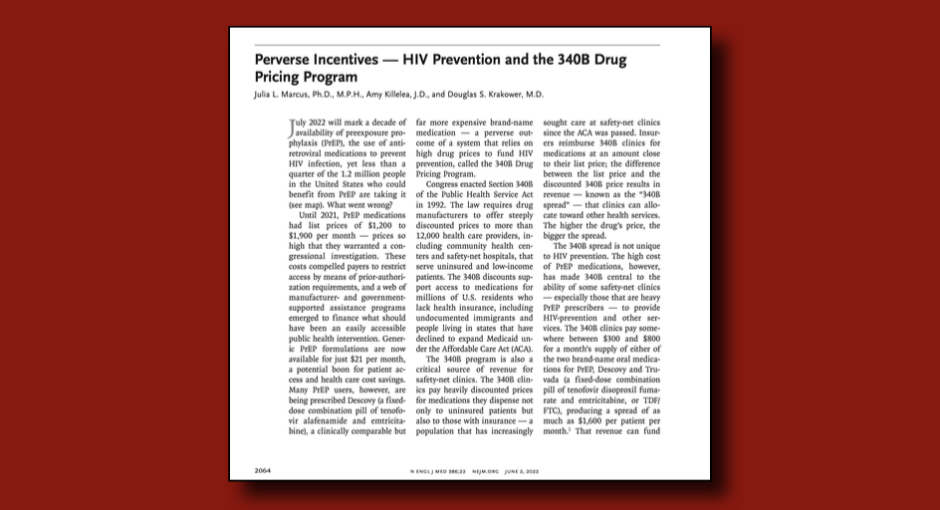Overreliance on 340B drug discount revenues to fund HIV-prevention services incentivizes clinics to prescribe high-cost medicines instead of cheaper effective options, “with dire consequences for [preexposure prophylaxis] PrEP access, impact, and equity,” says an opinion article published last weekend in the New England Journal of Medicine (NEJM).
AIDS Healthcare Foundation (AHF) and Ryan White Clinics for 340B Access (RWC-340B) executives separately highly criticized the article (subscription required) for tarring the 340B program and the clinicians who decide which PrEP medicines to prescribe. Drug companies that set PrEP prices and make PrEP patient assistance and reimbursement decisions are the problem, not 340B, both groups said.
Tim Horn, Director, Health Care Access at National Alliance of State & Territorial AIDS Directors (NASTAD) said the article highlighted fast-moving 340B program dynamics that “really are requiring us to think about how we can both sustain and expand essential medical and support services via financing that isn’t overly reliant on 340B and, by extension, high drug prices, manufacturer challenges, discriminatory reimbursement practices, and other threats to program savings.”
One of the article’s three authors—Amy Killelea, an independent public health policy consultant and NASTAD’s former Senior Director, Health Systems & Policy—described its main points in a Twitter thread posted on May 30.
“There are three things to consider when it comes to 340B and PrEP,” Killelea tweeted. “First, [the] 340B program is essential to the provision of life-saving antiretroviral medications for low-income people living with and at increased risk of HIV.”
“Second, the incentives in the 340B program encourage over-reliance on high-cost brand-name drugs, undermining the fight against HIV,” she continued. “And third, to end the HIV epidemic in this country, we need to protect 340B providers while broadly expanding access to generic PrEP.”
The NEJM essay noted that although generic PrEP formulations are now available for just $21 per month, many PrEP users are being prescribed Gilead’s branded product Descovy, which Killelea said on Twitter has a list price of about $1,900 for a month’s supply.
Killelea said Gilead “has used aggressive provider and consumer marketing to push” Descovy over generic PrEP, which she said “is equally safe and effective.” Also, Killelea said, “With a list price of about $1,900/month, Descovy can generate a big spread for 340B providers. With a price of about $21/month, generic [PrEP] doesn’t generate any spread.”
“Prescribing medications based on the revenue they can generate for a provider rather than whether they are clinically recommended presents an ethical crisis for providers,” Killelea said. “And let’s be clear—this isn’t all at the feet of 340B providers.”
“We’ve created a system where the only way they can fund services is to prescribe drugs people don’t need,” she said. “The system is broken and it’s the system that needs to be fixed.”
One of Killelea’s co-authors, Douglas Krakower of Harvard Medical School and Beth Israel Deaconess Medical Center, disclosed receiving research funding from Gilead and drug manufacturer Merck. The latter late last year paused clinical trials of a once-monthly PrEP medication.
AHF and RWC-340B Slam Study
John Hassell, National Director of Advocacy for AHF, said of the article: “The NEJM, known for not disclosing drug industry conflicts of interest, is at it again. This time it is an article that purports to be about 340B and PrEP, which shows the authors clearly do not understand either 340B or PrEP.”
“First, regarding 340B, drug companies are not ‘required’ to provide discounts,” Hassell said. “They are not required to do anything. 340B is a voluntary program which drug companies choose to participate in. They participate in it because they find it profitable to do so. No one is requiring them to do anything.”
“Second, the authors blithely assume Truvada and Descovy are identical, and then smear providers across the country for prescribing the more expensive Descovy,” he continued. “First, it need hardly be said that prescribing decisions are made based on unique patient decisions. Second, the authors seem unaware of the very real harms of Truvada, which is the subject of thousands of injury lawsuits across the country alleging bone loss and kidney damage as a result of taking it.”
“The drug industry needs to hire a higher class of hack, and the NEJM needs to decide if it’s an actual medical journal or a shill for the drug industry,” Hassell said.
Shannon Stephenson, President of RWC-340B and CEO of Tennessee-based federally qualified health center look-alike Cempa Cares, said, “The article is yet another example of a PhRMA-funded misinformation campaign to attack the 340B program.”
“In this case, the authors unfairly and wrongly portray Ryan White Clinics and our physicians as making clinical decisions for profit,” Stephenson said. “The truth is far from what is presented. Drug companies set drug prices. Our physicians prescribe what is medically indicated for our patients. There are very different clinical indications for the limited numbers of drugs in this space. As not-for-profit grantees participating in the 340B program, we are offended by this blatant attempt to sully the value and benefit of the 340B program, especially at the expense of those we serve, persons living with HIV and AIDs.”
Tim Horn of NASTAD said, “The 340B drug pricing program has been vitally important to HIV care and prevention programs nationwide, both from a cost-containment standpoint involving high-priced essential medicines and a savings generation standpoint involving otherwise limited funding required to fully meet the needs of people living with and vulnerable to HIV. Ensuring that 340B remains whole and accessible is essential to all strategies under the Ending the HIV Epidemic initiative, which was announced in 2019 and aims to effectively end HIV as an epidemic in the U.S. by 2030, and a major policy priority for NASTAD.”


